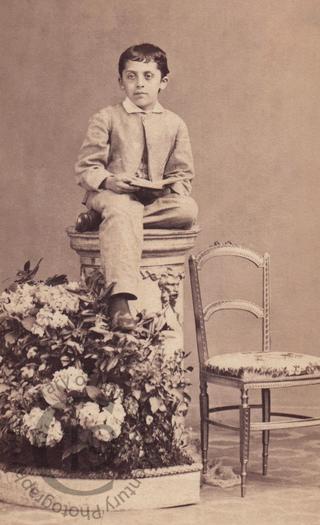
Hector Baltazzi
A carte-de-visite portrait of Hector Baltazzi (1854-1916), later a 'gentleman jockey.'
Born on 1 May 1854, Hector Baltazzi was one of the sons of the Greek banker Emmanuel Baltazzi, who had made a fortune at Smyrna and at Constantinople, where he levied the toll on the Pera Bridge.
Hector was educated in England at Rugby and became a keen rider and, eventually, a champion amateur jockey who won seventeen races. His brothers Alexander and Aristides Baltazzi jointly owned the Hungarian-bred horse Kisber, who in the summer of 1876 became the third of only six horses to win both The Derby and the Grand Prix de Paris. In England the brothers set up stables at Six Mile Bottom near Newmarket where they bred and trained champion racehorses.
According to report in the Washington Post (10 January 1915) following the death of Aristides Baltazzi, ‘Aristides enjoyed for a time a certain amount of social currency in Great Britain, on account of his connection with the turf, his knowledge of horseflesh being as superlative as his riding in flat races and steeplechases. But he outlived his welcome in England, and although he managed to secure grudging admission to the Jockey Club at Vienna, for much the same reason that he got on for a time in England, yet he never achieved anything like the same degree of acceptance by the great world on the banks of the Danube. His own admission, and that of his brother Hector, to the Jockey Club at Vienna, were regarded as largely responsible for the wane of that organization, for the withdrawal of Prince Montenuovo, grand master of the court, from the presidency, and for the retirement of many great nobles and leading sportsmen, who transferred their interests to the Nobles Club.’
In 1875 Hector married Countess Ugarte. The article in the Washington Post continues: ‘For the Austrian Baltazzis, who are Levantines, hailing from Constantinople, have never been received at the court of Vienna, and when Countess Anna Ugarte […] was led by her passion for horses, and for everything connected therewith, to foolishly bestow her hand upon Aristides’ brother Hector, she was considered to have rendered herself guilty of a terrible mésalliance, and although she continued to attend court balls and state functions at Vienna, as a member of the court circle, her husband Hector Baltazzi was never invited, was completely ignored, and was never permitted to cross the threshold of the Hofburg at Vienna.’
A sister, Helene Baltazzi, married Baron Albin Vetsera. Their daughter Maria became the mistress of Crown Prince Rudolf, heir to the Austro-Hungarian Empire, and died with him in a double-suicide pact at Mayerling in 1889.
The Washington Post continues: ‘Subsequent thereto, Countess Ugarte […] demanded and secured the judicial separation of her union to Hector Baltazzi, obtaining from Emperor Francis Joseph a special decree authorizing her to dispense in all legal matters with the name of Baltazzi, which she had never used in social intercourse. But in spire of her separation from her husband, she always imagined that owing to the fact that she had been the wife of a Baltazzi, people looked upon her as having been in some way indirectly connected with the tragedy of Meyerling [sic], and that they could not help thinking of her as an aunt by marriage of young Baroness Marie Vetsera. […] She left Austria, dividing her time between Paris and the hunting districts of Leicestershire in England, finally committing suicide at Melton Mowbray, shooting herself through the heart.’
Hector Baltazzi died in Vienna on 1 January 1916. ‘It appears Hector died of heart-disease at the Jockey Club in Vienna, in an armchair, in the reading-room, after breakfast, just as he was about to read the local racing paper. Two other members, entering the room, found him sitting there, apparently asleep. But on approaching him he was seen to be dead’ (Sporting Times, 12 February 1916).
According to another report in the same journal the following week, ‘Hector Baltazzi had lived in Paris since the Paris Exhibition of 1889, and occupied a little bachelor apartment at No. 6, rue Bassano, near the Etoile. The last time I saw him he was lunching chez Ritz at the big round “Diplomatic Table,” in the centre of the room, with a number of young Germhun [sic] and Austrian Embassy Attachés, who, as an esteemed correspondent very justly pointed out the other day, always enjoyed unlimited tick, and made eyes at every pretty girl in the room. […] I have an idea little Hector, who was 65 years old when he died, and dabbled in works of art and virtue, was also frequently “hearts of oak” [broke], or as Parisians say, dans la purée, and that he enjoyed all the credit he needed’ (Sporting Times, 22 January 1916).
Code: 127052




